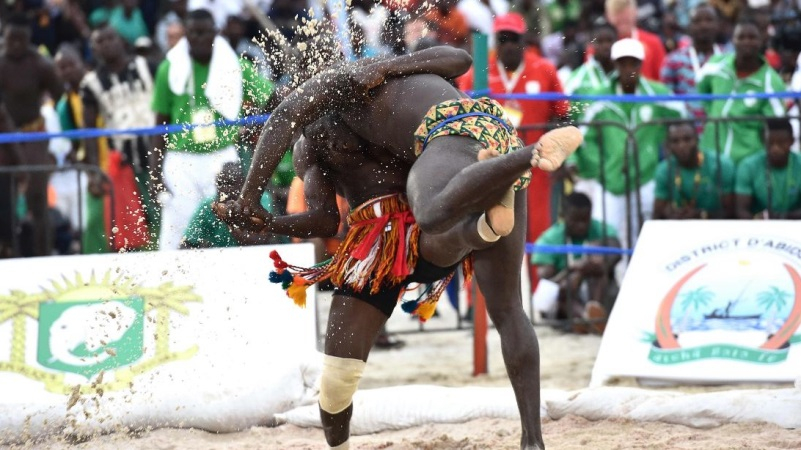Nina Wang, a businesswoman with a petite frame, had a good reason to leave work early on Thursday. She was taking her 7-year-old son to meet Cristiano Ronaldo. The two were heading to Sanlitun, where a massive crowd was scrambling for the best position to catch a glimpse of the new Juventus megastar.
Much in the same way that a little boy in China dreams of becoming the next Ronaldo, in Senegal a young kid set his sights on matching Modou Lo, one of the most sought-after and highly-rated wrestler in the national game.
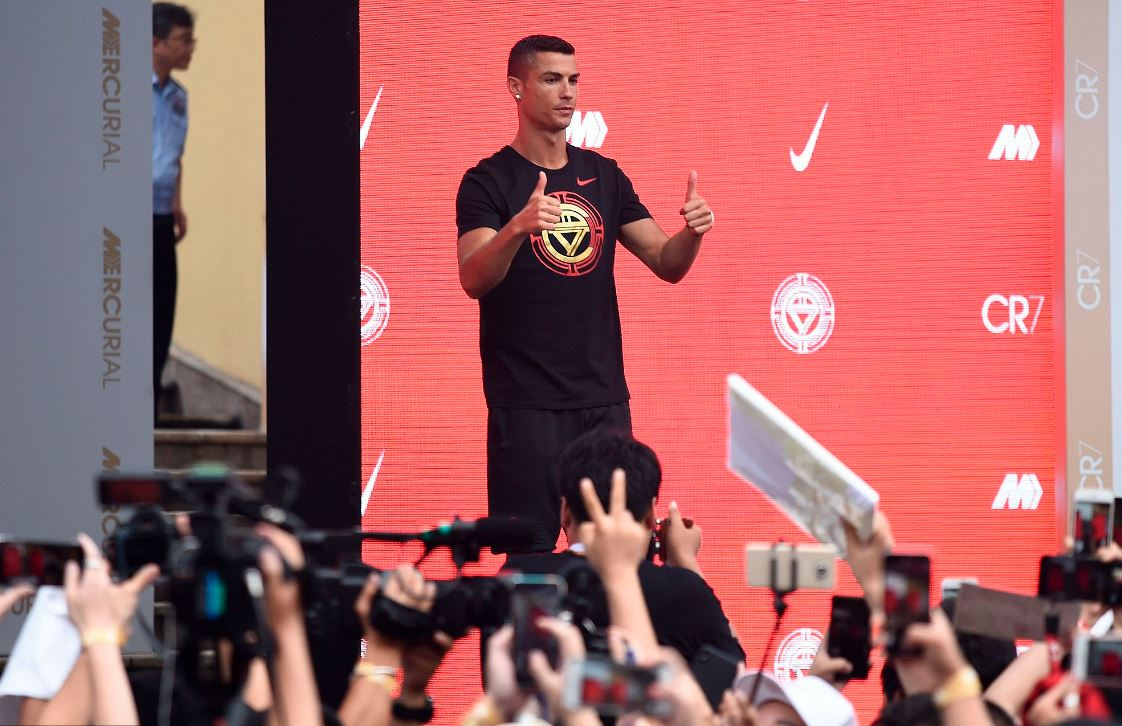
Cristiano Ronaldo fever hits China as he gestures the thumbs up during a promotional event in Beijing. /VCG Photo
Cristiano Ronaldo fever hits China as he gestures the thumbs up during a promotional event in Beijing. /VCG Photo
When wrestling meets Wuxia fantasy
Although wrestling is highly prevalent throughout West Africa, the version in Senegal, also known as Laamb in Wolof, has risen to unprecedented heights. Unlike other forms of wrestling, Laamb allows the wrestlers to punch each other with their bare hands in certain matches. When a wrestler's head, back or both hands and knees touch the ground, the combat is over.
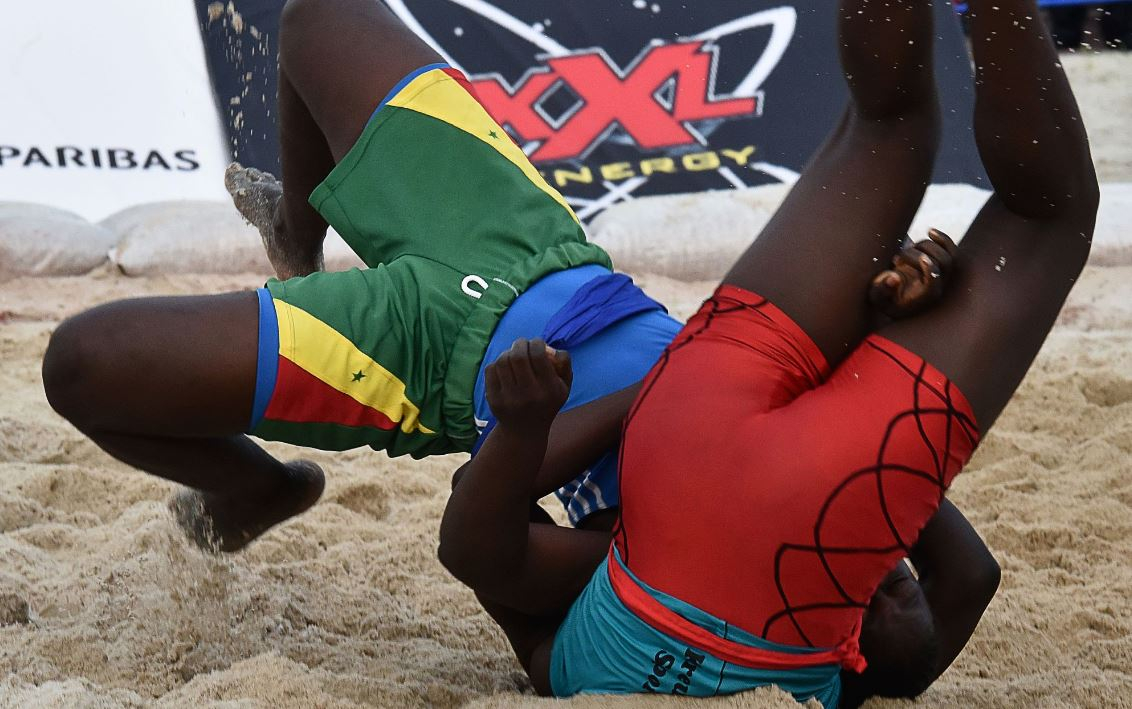
Senegalese wrestling differs from wrestling matches in western and Asian countries. /VCG Photo
Senegalese wrestling differs from wrestling matches in western and Asian countries. /VCG Photo
Engrossing and sometimes thrilling, the various rites and rituals before the fighting would satisfy your deepest craving for novelty. Each loincloth-clad combatant is accompanied by his marabout, a Muslim holy man who put gris-gris, a Voodoo amulet which is believed to protect the wearer from evil spirits, around the grappler’s arms, legs and waists.
Welcomed by battle songs and a chorus of volatile drumming, the wrestlers, feet deep in the sand, showcase their nimble dancing skills, pacing around the ring and preparing to grapple in pairs. Occasionally, out of the blue, sand kicks into the air as one is sent flying, like one of the blood-curdling scenes from Tsui Hark's Wuxia fantasies. The audience loved it.
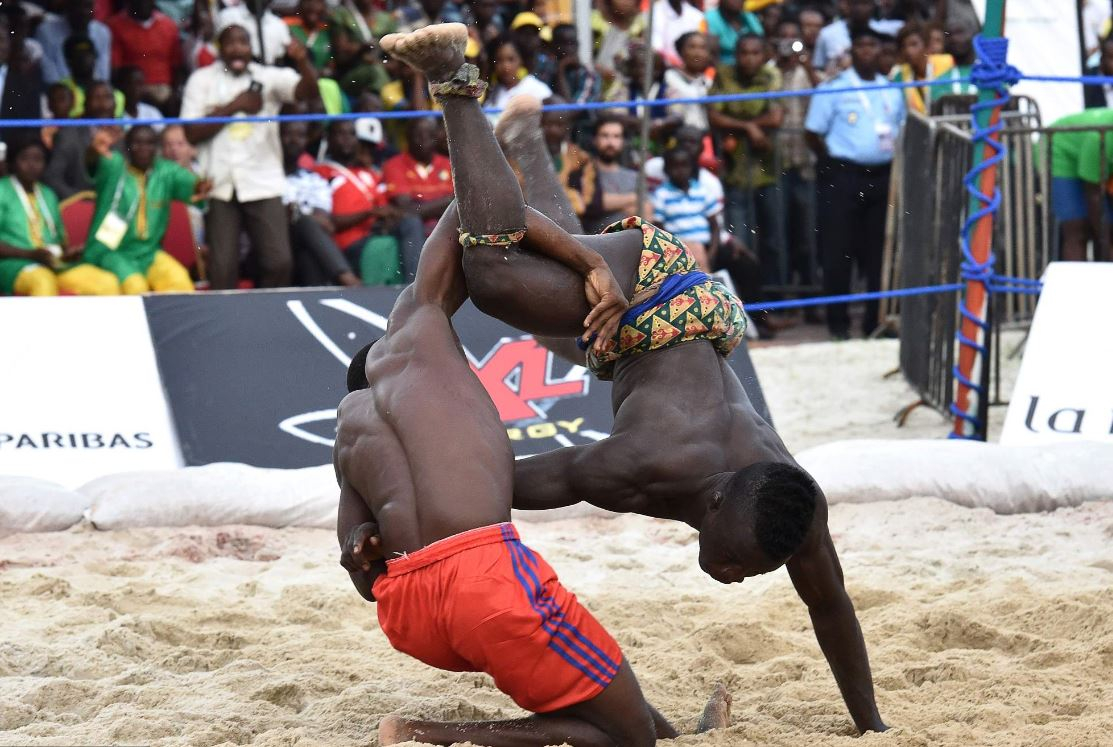
Senegalese wrestling is a sport that has conquered the hearts of all Senegalese. /VCG Photo
Senegalese wrestling is a sport that has conquered the hearts of all Senegalese. /VCG Photo
Senegalese wrestling attracts a huge number of viewers and even larger sponsors. Professional wrestler can earn hundreds to thousands of dollars in endorsements, according to the local news media. The centuries-old sport's popularity has grown significantly, and elite wrestlers are considered national heroes.
However, despite the lofty status, wrestling still lacks its own infrastructure, with fights usually staged in woeful soccer stadiums. Fortunately, the situation will largely improve as the construction on a purpose-built wrestling stadium in the capital city of Dakar is slated to wrap up on Saturday.
The new 20,000-capacity stadium, built at the cost of about 42 million US dollars, is a China-funded project that kicked off in May 2016. Upon completion, it will be the first wrestling arena on the African continent, paving the way for Laamb's further growth.
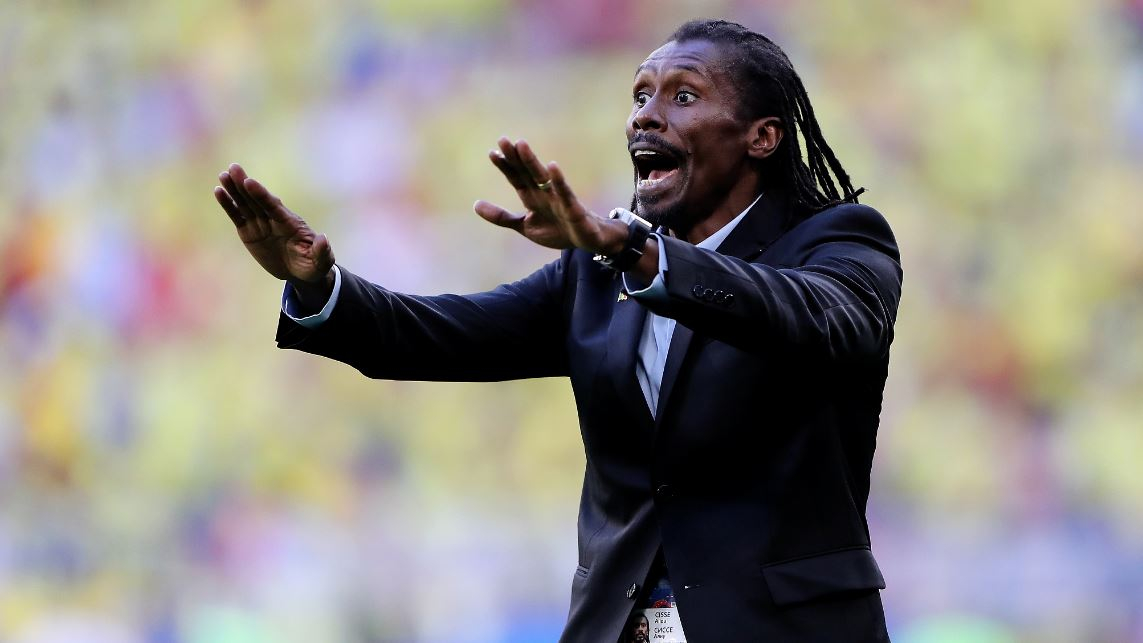
Senegal’s Aliou Cisse is the 2018 World Cup’s youngest and only black manager. /VCG Photo
Senegal’s Aliou Cisse is the 2018 World Cup’s youngest and only black manager. /VCG Photo
A force to be reckoned with
While wrestling is indisputably the most popular sport in Senegal, soccer dominates the stage across the country.
The Lions of Teranga pulled off one of the biggest upsets in World Cup history when they stunned reigning champions France with a 1-0 victory in 2002. The French, despite boasting a line-up full of A-list stars, were destroyed by the Senegalese. They limped out of the tournament without having scored a single goal.
It was the darkest day for France, but this would go down in the records as one of the greatest feats in the history of African football, rivaling Cameroon's defeat of Argentina in 1990. With sky-high confidence, Senegal went on to reach the quarter-finals, capping off a brilliant World Cup campaign.
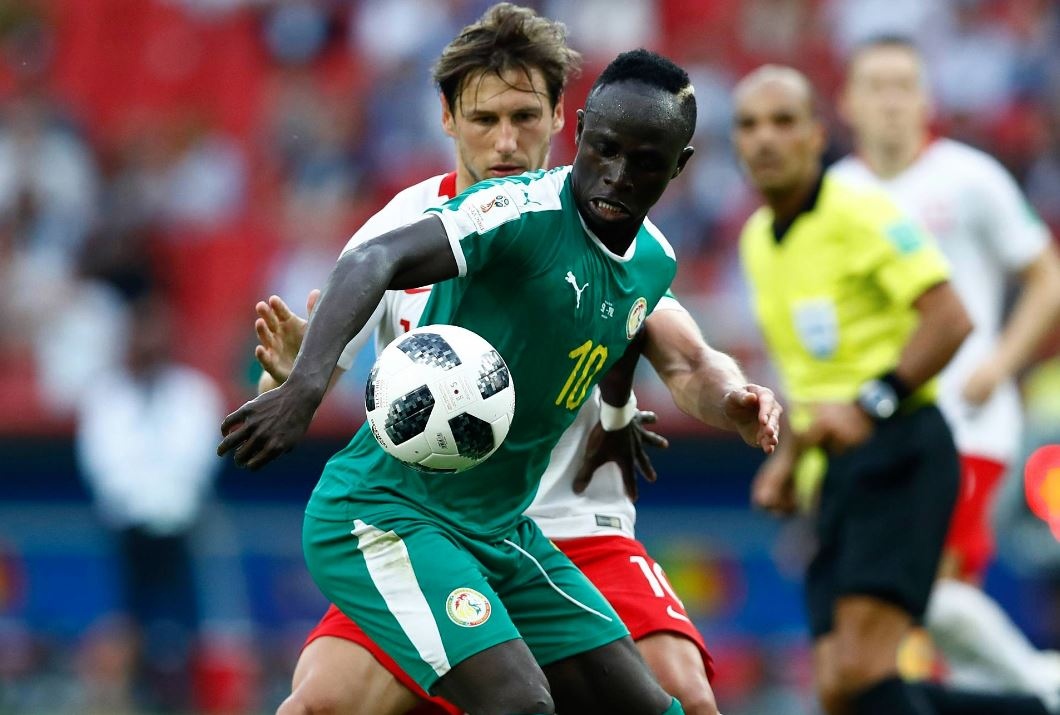
Sadio Mane helps Senegal record the first African win at the 2018 World Cup when they beat Poland 2-1. /VCG Photo
Sadio Mane helps Senegal record the first African win at the 2018 World Cup when they beat Poland 2-1. /VCG Photo
Regrettably, things went south once the final act of the golden generation came to an end. Having failed to qualify for three consecutive World Cups under a string of different managers, Senegal turned to Aliou Cisse, their charismatic captain in 2002, to steady the ship.
With the former midfielder at the helm, Senegal did not lose a single game on their route to Russia, comfortably advancing to their first World Cup in 16 years. Aliou Cisse's men had been determined to emulate their 2002 World Cup heroes. Instead, they would make a piece of unwanted history, becoming the first team to be eliminated from the World Cup on the fair play rule.
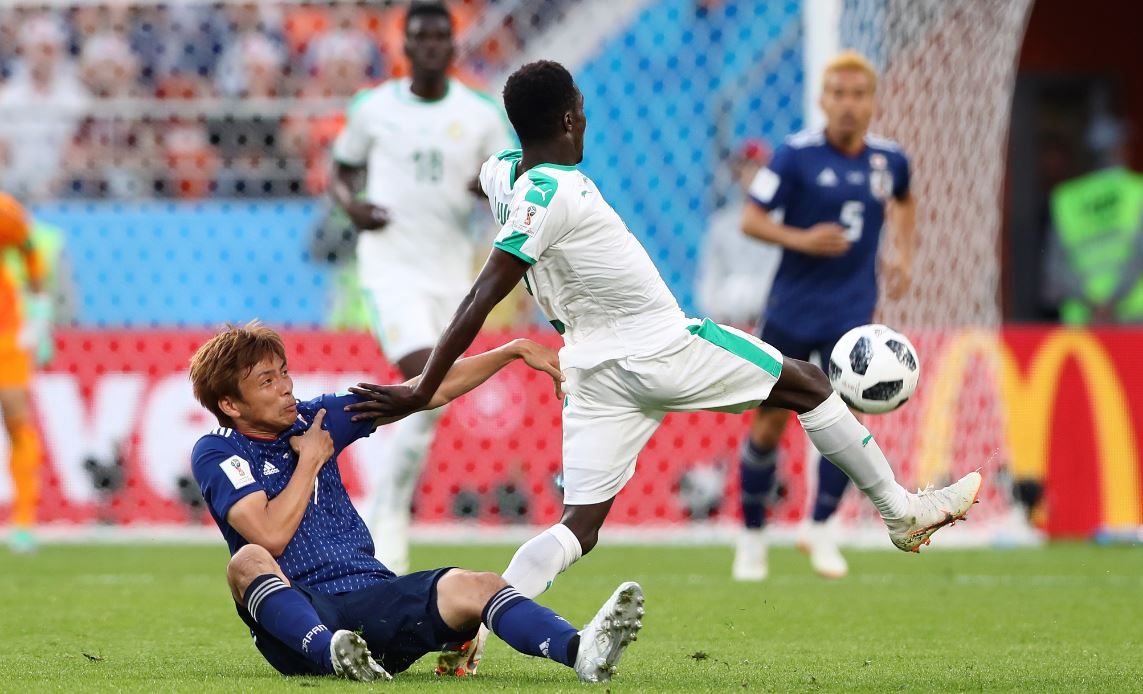
Senegal became the last African team to be eliminated from the World Cup – by the narrowest and cruelest of margins. /VCG Photo
Senegal became the last African team to be eliminated from the World Cup – by the narrowest and cruelest of margins. /VCG Photo
After the final group game, Senegal and Japan leveled on points, goal difference and head-to-head, which meant that Africa's sole remaining hope in Russia fell just short of making the knockout stage due to having accumulated two more yellow cards than the Blue Samurai.
Destiny played a cruel hand in Senegal's premature exit, but they would depart the tournament with their heads held high.
Sadio Mane and company have displayed enviable tenacity and tactical nous throughout the campaign, and if the Senegal manager finally succeeds in getting the best out of the attacking talent at his disposal, the sleeping lion might wake up, and the world will be stunned once again. Just like the Real Madrid exit bombshell Cristiano Ronaldo dropped last week.

